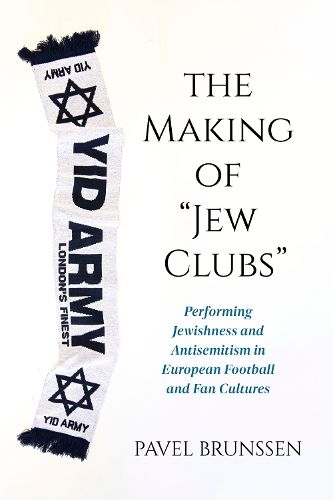Readings Newsletter
Become a Readings Member to make your shopping experience even easier.
Sign in or sign up for free!
You’re not far away from qualifying for FREE standard shipping within Australia
You’ve qualified for FREE standard shipping within Australia
The cart is loading…






Why do non-Jewish football fans chant "Yid Army" or wave "Super Jews" banners-especially in support of clubs that are not Jewish? The Making of "Jew Clubs" explores how four major European football clubs-FC Bayern Munich, FK Austria Vienna, Ajax Amsterdam, and Tottenham Hotspur-came to be seen as "Jew Clubs," even though they have never officially identified as Jewish.
In this transnational study, Pavel Brunssen traces how both Jewish and non-Jewish actors perform Jewishness, antisemitism, and philosemitism within European football cultures over the 20th and 21st centuries. Drawing on a wide array of primary sources-from fan chants and matchday rituals to media portrayals and club histories-the book reveals how football stadiums have become unexpected stages for negotiating memory, identity, and historical trauma.
Offering a new approach to Holocaust memory, sports history, and Jewish studies, The Making of "Jew Clubs" shows how football cultures reflect and reshape Europe's conflicted relationship with its Jewish past.
$9.00 standard shipping within Australia
FREE standard shipping within Australia for orders over $100.00
Express & International shipping calculated at checkout
Why do non-Jewish football fans chant "Yid Army" or wave "Super Jews" banners-especially in support of clubs that are not Jewish? The Making of "Jew Clubs" explores how four major European football clubs-FC Bayern Munich, FK Austria Vienna, Ajax Amsterdam, and Tottenham Hotspur-came to be seen as "Jew Clubs," even though they have never officially identified as Jewish.
In this transnational study, Pavel Brunssen traces how both Jewish and non-Jewish actors perform Jewishness, antisemitism, and philosemitism within European football cultures over the 20th and 21st centuries. Drawing on a wide array of primary sources-from fan chants and matchday rituals to media portrayals and club histories-the book reveals how football stadiums have become unexpected stages for negotiating memory, identity, and historical trauma.
Offering a new approach to Holocaust memory, sports history, and Jewish studies, The Making of "Jew Clubs" shows how football cultures reflect and reshape Europe's conflicted relationship with its Jewish past.